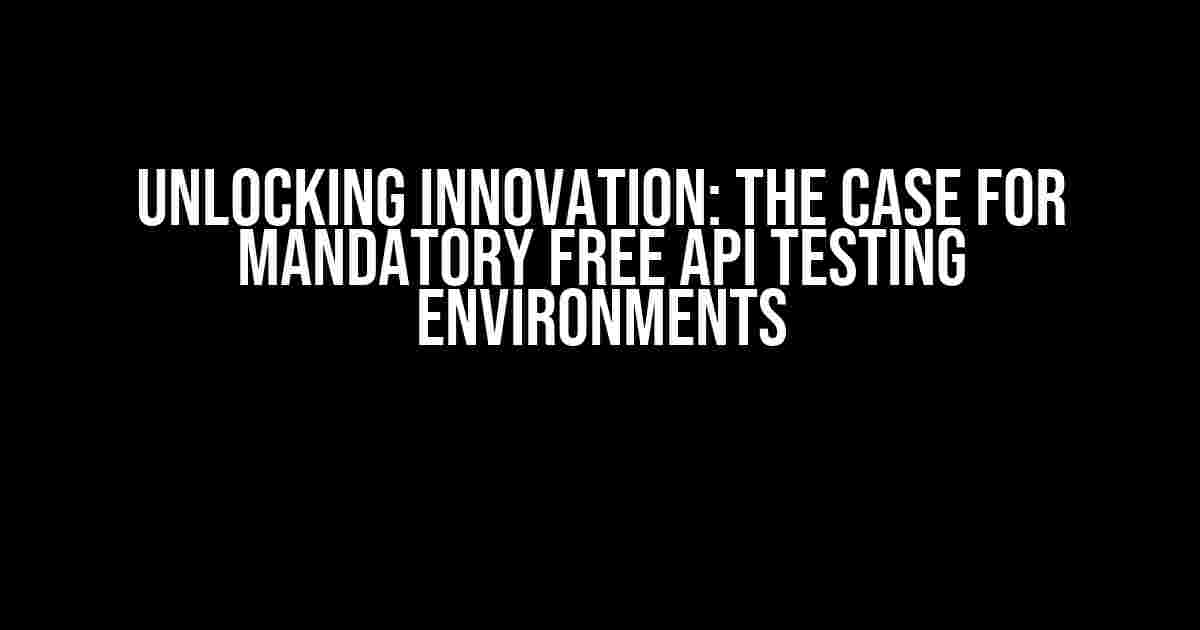Imagine a world where developers can freely experiment and test APIs without incurring hefty costs or jumping through hoops to get a glimpse of the API’s capabilities. A law requiring all paid APIs to have a free testing or playground environment would be a game-changer for innovation and collaboration. But how would you feel about such a law, and what would be the implications?
The Benefits of Mandatory Free API Testing Environments
-
Democratization of Access: A free testing environment would level the playing field, allowing developers of all backgrounds and income levels to access and explore APIs without financial barriers.
-
Increased Innovation: By providing a risk-free space to experiment, developers would be more likely to try new APIs, leading to the creation of novel applications and innovative solutions.
-
Improved API Quality: With more developers testing and providing feedback, API providers would be motivated to improve the quality and reliability of their offerings, enhancing the overall ecosystem.
Addressing Concerns and Implementation Challenges
-
Cost and Resource Allocation: API providers might express concerns about the additional costs and resources required to maintain a free testing environment. However, this could be offset by the increased adoption and revenue generated from paid subscriptions.
-
Security and Abuse: Implementing safeguards to prevent abuse and ensure the security of the free testing environment would be essential. This could be achieved through rate limiting, access controls, and monitoring.
-
Defining the Scope of the Law: Clear guidelines and definitions would be necessary to determine what constitutes a “free testing environment” and which APIs would be affected by the law.
The Future of API Development and Collaboration
If a law requiring free API testing environments were to be enacted, it would likely have far-reaching consequences for the developer community and the API industry as a whole. By providing a platform for experimentation and innovation, we can unlock new possibilities and drive progress in the digital landscape.
The question is no longer “How would you feel if a law went into place requiring all paid APIs to have a free testing/playground?” but rather “What amazing things will we create when we unlock the full potential of APIs?”
Here are 5 Questions and Answers about “How would you feel if a law went into place requiring all paid APIs to have a free testing/playground?”
Frequently Asked Question
Discover the pros and cons of a law that makes paid APIs provide a free testing or playground environment.
Would this law stifle innovation in the API industry?
Not necessarily. While it’s true that providing a free testing environment might add some upfront costs for API providers, it would also encourage developers to experiment and innovate, leading to more innovative use cases and ultimately driving growth in the API industry.
How would this law benefit developers and startups?
A free testing environment would allow developers and startups to try out APIs without breaking the bank, reducing the financial risk associated with integrating a new API. This would lead to more experimentation, faster prototyping, and ultimately, more innovative solutions.
Wouldn’t this law be a logistical nightmare for API providers?
While there would be some additional overhead, API providers could simply create a sandbox environment that mimics their production API, but with limited functionality or data. This would allow developers to test and play without jeopardizing the security or integrity of the production API.
How would this law impact the revenue of API providers?
While providing a free testing environment might reduce the revenue of API providers in the short term, it would ultimately lead to more widespread adoption and increased revenue in the long term. Developers would be more likely to integrate APIs they’ve tested and played with, leading to increased usage and revenue for API providers.
Would this law actually hinder the development of high-quality APIs?
On the contrary, a free testing environment would allow developers to provide feedback and identify bugs earlier in the development process, leading to higher-quality APIs that meet the needs of developers and users alike. This would ultimately drive up the overall quality of the API ecosystem.
